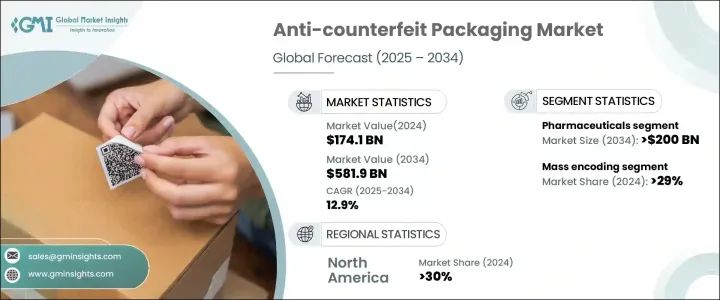
세계의 위조 방지 포장 시장은 2024년에 1,741억 달러에 달했고, 2025년부터 2034년까지 연평균 복합 성장률(CAGR) 12.9%를 나타낼 것으로 예측됩니다.
의약품, 식음료, 전자기기, 기호품 등의 업계에서 위조품이 만연하고 있는 것이 시장 성장을 가속하는 주요 요인이 되고 있습니다. 세계 기업들이 브랜드 보호, 소비자 안전, 재무 안전을 우선시하는 경향이 강해지고 있으며, 선진적인 위조 방지 포장 솔루션 수요를 뒷받침하고 있습니다. 위조품은 심각한 건강 위험을 초래할 뿐만 아니라 기업의 수익 손실로 이어져 브랜드의 명성을 해치게 됩니다.

정부와 규제기관은 부정제품의 급증에 대항하기 위해 정책을 강화하고 엄격한 위조 방지 대책을 실시했습니다. 또한 세계화와 전자상거래의 확대로 공급망이 복잡해지고 추적성과 변조 방지를 위한 포장 솔루션의 필요성이 높아지고 있습니다. 블록체인, 스마트 라벨, 전자 워터마크 등의 최첨단 기술은 실시간 인증을 제공하고 라이프사이클을 통해 제품의 무결성을 보장하기 위해 지지를 받고 있습니다. 시장의 급속한 진화는 소비자의 의식이 증가함에 따라 제조업체가 위조와 관련된 위험을 줄이는 견고한 보안 대책에 대한 투자를 장려하고 있기 때문입니다.
| 시장 규모 | |
|---|---|
| 시작 연도 | 2024년 |
| 예측 연도 | 2025-2034년 |
| 시작 금액 | 1,741억 달러 |
| 예측 금액 | 5,819억 달러 |
| CAGR | 12.9% |
위조 방지 포장 시장은 대량 인코딩, 포렌식 마커, RFID, 변조 증거, 홀로그램 및 기타 보안 솔루션과 같은 기술에 따라 분류됩니다. 이 중 대량 인코딩은 2024년에 29%의 점유율을 차지해 제품의 진정성을 확보하기 위한 유력한 선택이 되었습니다. 이 기술은 포장에 고유한 식별자를 포함하여 기업과 소비자가 전용 장치 및 모바일 애플리케이션을 사용하여 제품의 정당성을 확인할 수 있습니다. 대량 인코딩은 비용 효율적인 보안 기능, 확장성 및 대규모 생산 공정를 보호하는 능력으로 널리 채택되었습니다. 위조 기술이 점차 정교해짐에 따라 고급 인코딩 기술에 대한 수요는 계속 증가하고 시장 확대를 추진하고 있습니다.
용도별로 보면, 시장은 고급품, 의류 및 신발, 자동차, 식음료, 퍼스널케어, 의약품, 전기 및 전자 등의 업계에 퍼지고 있습니다. 의약품 분야는 CAGR 15%를 나타내 2034년까지 2,000억 달러를 창출할 것으로 예측됩니다. 의약품 온라인 판매가 증가함에 따라 위조 의약품이 공급망에 혼입될 위험이 크게 증가하고 있습니다. 이에 대응하기 위해 기업은 특히 전자상거래 거래에서 제품의 진정성과 소비자의 안전을 보장하는 최첨단 위조 방지 포장 솔루션을 도입하고 있습니다. 블록체인 기반 추적성, 전자 워터마크, IoT 지원 스마트 포장 등의 기술이 이 분야에 혁명을 일으켜 제약 회사가 엄격한 규정 준수 기준을 유지함과 동시에 소비자를 잠재적으로 유해한 위조 의약품으로부터 보호하는 데 도움이 됩니다.
북미는 2024년 위조 방지 포장 시장의 30% 점유율을 차지했는데, 이는 소비자의 안전성을 높이고 브랜드 무결성을 보호하기 위한 노력이 강화된 것이 배경에 있습니다. 기업은 위조품의 침입을 방지하기 위해 RFID, 홀로그램, 변조 방지 씰 등의 고급 보안 기능을 통합하고 있습니다. 블록체인 기술은 또한 타의 추종을 불허하는 추적성과 인증을 제공할 수 있는 능력에 힘입어 다양한 산업에서 보안을 강화하고 있습니다. 이 지역의 강력한 규제 상황은 스마트 포장 솔루션에 대한 투자가 증가함에 따라 북미를 위조품과의 세계 전투에서 중요한 선수로 자리 매김하고 있습니다. 기업이 투명성과 혁신을 우선시하는 가운데, 신뢰할 수 있는 위조 방지 포장 솔루션에 대한 수요는 향후 수년간 급증할 것으로 예상됩니다.
The Global Anti-Counterfeit Packaging Market reached USD 174.1 billion in 2024 and is expected to expand at a CAGR of 12.9% from 2025 to 2034. The growing prevalence of counterfeit products across industries such as pharmaceuticals, food and beverages, electronics, and luxury goods is a major factor driving market growth. Companies worldwide are increasingly prioritizing brand protection, consumer safety, and financial security, fueling demand for advanced anti-counterfeit packaging solutions. Counterfeit goods not only pose significant health risks but also lead to revenue losses for businesses and damage brand reputations.

Governments and regulatory bodies are tightening policies and enforcing stringent anti-counterfeiting measures to combat the surge in fraudulent products. Additionally, increasing globalization and e-commerce expansion have made supply chains more complex, elevating the need for traceable and tamper-proof packaging solutions. Cutting-edge technologies such as blockchain, smart labels, and digital watermarks are gaining traction as they provide real-time authentication and ensure the integrity of products throughout their lifecycle. The market's rapid evolution is also attributed to growing consumer awareness, prompting manufacturers to invest in robust security measures that mitigate risks associated with counterfeiting.
| Market Scope | |
|---|---|
| Start Year | 2024 |
| Forecast Year | 2025-2034 |
| Start Value | $174.1 Billion |
| Forecast Value | $581.9 Billion |
| CAGR | 12.9% |
The anti-counterfeit packaging market is categorized based on technology, including mass encoding, forensic markers, RFID, tamper evidence, holograms, and other security solutions. Among these, mass encoding held a 29% share in 2024, making it a dominant choice for securing product authenticity. This technology embeds unique identifiers within packaging, allowing businesses and consumers to verify product legitimacy using specialized devices or mobile applications. Mass encoding is widely adopted due to its cost-effective security features, scalability, and ability to safeguard large-scale production processes. As counterfeiting techniques become increasingly sophisticated, the demand for advanced encoding methods continues to grow, reinforcing the market's expansion.
By application, the market spans industries such as luxury goods, apparel and footwear, automotive, food and beverage, personal care, pharmaceuticals, and electrical and electronics. The pharmaceutical sector is projected to grow at a CAGR of 15% and is anticipated to generate USD 200 billion by 2034. The rise of online pharmaceutical sales has significantly heightened the risk of counterfeit drugs entering the supply chain. To counteract this, companies are implementing cutting-edge anti-counterfeit packaging solutions that ensure product authenticity and consumer safety, particularly within e-commerce transactions. Technologies such as blockchain-based traceability, digital watermarks, and IoT-enabled smart packaging are revolutionizing the sector, helping pharmaceutical companies maintain stringent compliance standards while protecting consumers from potentially harmful counterfeit medications.
North America held a 30% share of the anti-counterfeit packaging market in 2024, driven by heightened efforts to enhance consumer safety and protect brand integrity. Businesses are integrating advanced security features such as RFID, holograms, and tamper-evident seals to prevent counterfeit infiltration. Blockchain technology is also gaining momentum due to its ability to provide unparalleled traceability and authentication, reinforcing security across various industries. The region's strong regulatory landscape, combined with increasing investments in smart packaging solutions, positions North America as a key player in the global fight against counterfeiting. As companies continue to prioritize transparency and innovation, the demand for reliable anti-counterfeit packaging solutions is expected to surge in the coming years.